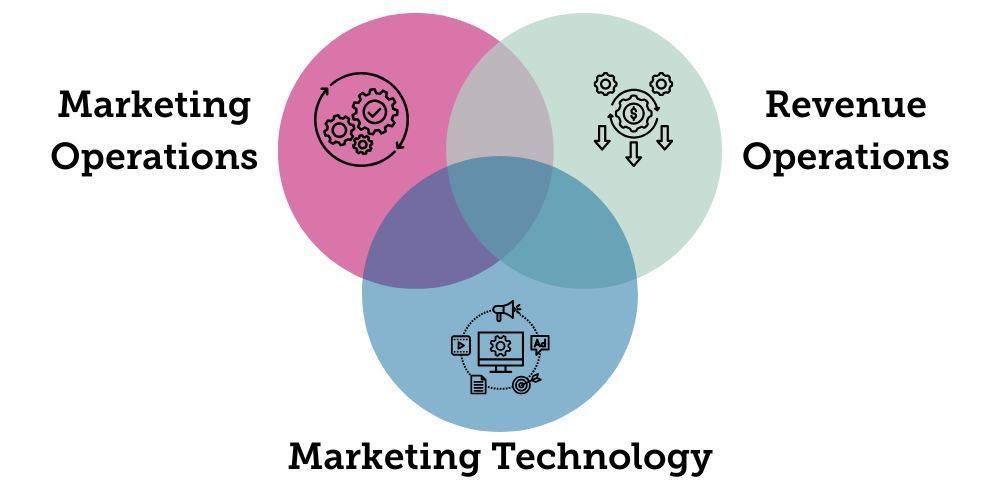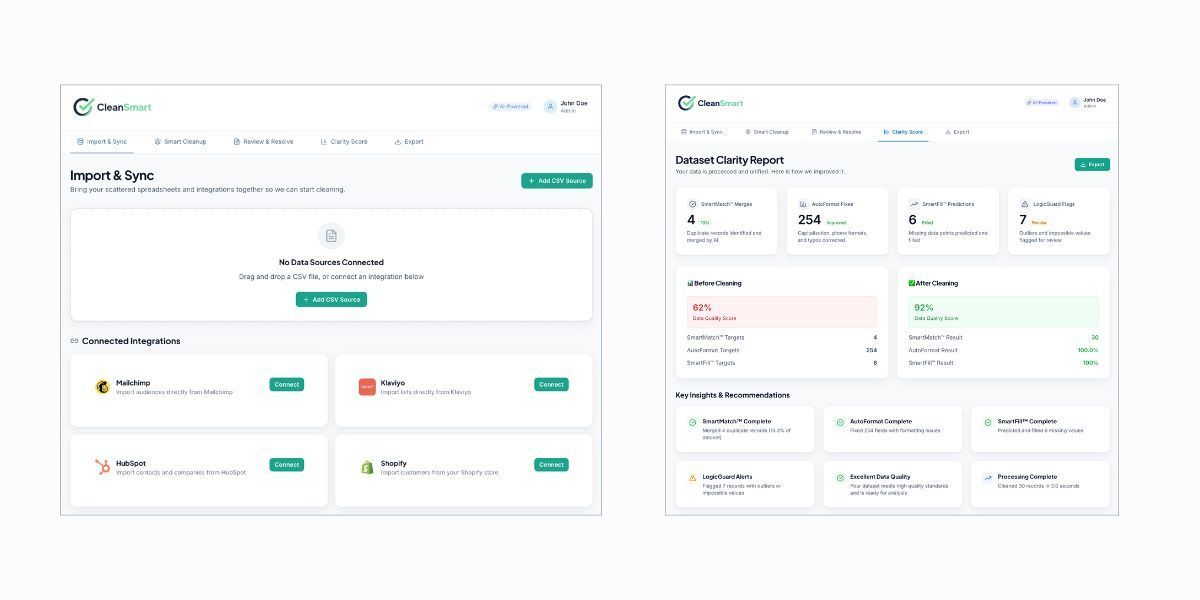Marketing Ops vs. RevOps vs. MarTech: How to Know Which You Actually Need
The $400,000 Org Chart That Fixed Nothing
A B2B SaaS company called me after six months of frustration. They had hired a VP of Revenue Operations at a healthy salary, reorganized their entire go-to-market team under this new leader, and invested in a "unified revenue tech stack."
The close rate on their trade show leads? Still 6%.
Same as before the reorg. Same as before the new hire. Same as before the six-figure technology investment.
Their board wanted answers. The new VP wanted answers. And honestly, I wanted answers too, because on paper they had done everything right. They read the LinkedIn thought pieces. They followed the playbook. RevOps was supposed to be the answer.
It wasn't.
What INRIX actually needed was something far less glamorous than a new org structure. They needed someone to look at their Pardot instance and ask a simple question: "Why are you sending the same nurture sequence to a Fortune 500 fleet manager and a municipal parking authority?"
The answer, of course, was that nobody had bothered to segment the leads properly. The data existed. The tools existed. The team existed. But the execution? Completely absent.
Four months later, after we redesigned their nurture sequences around actual buyer personas and implemented proper lead scoring, their close rate jumped to 17%. Nearly triple. No reorg required.

The Question Nobody Asks
Here's what frustrates me about the Marketing Ops vs. RevOps vs. MarTech debate: it starts with the wrong question.
Companies ask "What function do we need?" when they should ask "What problem are we solving?"
I've spent two decades watching this pattern repeat. A company struggles with lead conversion, pipeline velocity, or customer retention. They Google the symptoms. They find articles explaining that Marketing Ops focuses on marketing-specific processes while RevOps takes a holistic view across the entire revenue lifecycle. They read about how MarTech is the enabling layer underneath both functions.
Armed with this knowledge, they make a decision. Hire a RevOps leader. Or restructure Marketing Ops. Or buy a new platform.
And nothing changes.
The problem isn't their org chart. The problem is usually one of three things: dirty data, disconnected systems, or undefined processes. Sometimes all three. You can reorganize the deck chairs all you want, but if the underlying operational foundation is broken, no amount of functional alignment will save you.
What These Terms Actually Mean (The 60-Second Version)
Before we go further, let me give you the definitions. Not because they're the answer, but because you need shared vocabulary to have the right conversation.
Marketing Operations emerged in the early 2000s as marketing departments became more complex and data-driven. Marketing Ops teams own the marketing technology stack, manage campaign execution processes, handle data and analytics for marketing performance, and ensure marketing activities connect to business outcomes. Their scope typically ends where the lead hands off to sales.
Revenue Operations is the newer kid, gaining serious traction around 2018-2019. RevOps takes a broader view, unifying Marketing Ops, Sales Ops, and Customer Success Ops under a single operational umbrella. The premise: revenue is a continuous lifecycle, not a series of handoffs between siloed teams. RevOps teams own the entire tech stack across the revenue cycle, standardize processes from first touch to renewal, and create unified metrics that track the complete customer journey.
MarTech isn't a function at all. It's the ecosystem of tools and platforms that enable both Marketing Ops and RevOps to do their jobs. The MarTech landscape exploded from roughly 150 solutions in 2011 to over 14,000 today. CRMs, marketing automation platforms, CDPs, analytics tools, attribution software... all MarTech.
Here's the relationship that matters: Marketing Ops and RevOps are organizational functions. MarTech is the enabling layer. You can have Marketing Ops without RevOps. You can have RevOps that absorbs Marketing Ops. But you cannot have either without MarTech, and you cannot make MarTech work without one of those functions owning it.
Got it? Good. Now forget the definitions and focus on what actually matters.

Three Companies That Misdiagnosed Their Problem
Let me tell you about three organizations I worked with. Each thought they had a functional or technology problem. None of them did.
INRIX: The Trade Show Lead Graveyard
I mentioned INRIX earlier. They're a B2B SaaS company in the transportation data space. Enterprise sales cycles, complex buyer committees, lots of industry events.
They were collecting hundreds of leads at trade shows and conferences. Quality contacts from target accounts. Real decision-makers stopping by the booth, scanning badges, expressing genuine interest.
Then... nothing. A 6% close rate on nurture campaigns. Hundreds of potential deals evaporating.
Their diagnosis? "We need RevOps to align marketing and sales around these leads."
My diagnosis? "You need to stop treating a VP of Fleet Operations at FedEx the same way you treat a parking enforcement supervisor at a mid-sized city."
The fix wasn't organizational. It was operational. We segmented leads based on company size, industry vertical, and buyer role. We created distinct nurture tracks for each segment. We implemented lead scoring that prioritized based on engagement signals, not just title.
Same team. Same tools. Same trade shows. Close rate: 17% within four months.
CT3 Education: The CRM Nobody Trusted
CT3 is an education technology company. When I started working with them, their sales team had a ritual. Every Monday morning, they'd export their CRM data to Excel, manually clean it up, and work from the spreadsheet for the rest of the week.
Think about that. They had Salesforce. They had a marketing automation platform. They had all the tools. But nobody trusted the data enough to use them.
Duplicates everywhere. Contacts associated with the wrong accounts. Historical activity scattered across multiple records for the same person. The CRM had become a liability, not an asset.
Their initial ask? "We need better marketing automation to improve our campaigns."
My response? "Your marketing automation will only amplify the chaos in your CRM. We need to fix the foundation first."
We spent three months on a comprehensive data cleanup. Deduplication. Normalization. Proper account hierarchies. New data entry standards. Governance policies. Dashboards to catch anomalies before they metastasized.
Then, and only then, did we implement the marketing automation strategy they originally wanted.
The result? A consistent 5-7% monthly increase in closed deals over the following year. Not because of better campaigns. Because the campaigns finally had accurate data to work with.
Nielsen: The Integration That Changed Everything
Nielsen came to me with a familiar story. Fragmented lead generation. Low conversion rates. Marketing and sales pointing fingers at each other.
Their proposed solution? "We need a new marketing automation platform. The current one isn't working."
The current platform was Marketo. One of the best in the business. The platform wasn't the problem.
The problem was that Marketo and Salesforce weren't talking to each other properly. Lead data flowed inconsistently. Sales couldn't see marketing engagement. Marketing couldn't see sales activity. Each team operated with an incomplete picture.
We didn't replace anything. We integrated properly. Aligned the data models. Created shared definitions for lead stages. Built visibility across the full funnel.
Results: 11% increase in total leads generated. 23% increase in close rates within six months.
Same platforms. Same teams. Different outcome.
The Pattern You Should Notice
All three companies started with the wrong diagnosis.
INRIX thought they needed organizational alignment (RevOps). They needed segmentation and personalization (execution).
CT3 thought they needed better marketing automation (MarTech). They needed clean data (foundation).
Nielsen thought they needed a new platform (MarTech). They needed proper integration (execution).
The pattern: companies default to structural or technological solutions when the real problem is operational execution.
Why? Because structural and technological solutions are easier to buy. You can hire a RevOps leader. You can purchase a new platform. You can reorganize teams on a slide deck.
Fixing your data? That's tedious. Implementing proper processes? That requires discipline. Integrating systems correctly? That demands technical expertise and cross-functional cooperation.
The hard work doesn't have a logo or a LinkedIn announcement. But it's where results come from.

A Framework for Diagnosing What You Actually Need
So how do you figure out what your organization actually needs? I use a diagnostic framework with my clients that starts with symptoms and works backward to root causes.
Step 1: Name the Business Problem
Not the suspected solution. The actual business problem.
- Bad: "We need RevOps." Good: "Our pipeline velocity has dropped 30% and we don't know why."
- Bad: "We need a new marketing automation platform." Good: "Only 12% of MQLs convert to SQLs, down from 25% eighteen months ago."
- Bad: "We need to hire a Marketing Ops manager." Good: "Campaign execution takes three weeks when it should take three days."
If you can't articulate the business problem in terms of a metric that matters, you're not ready to evaluate solutions.
Step 2: Audit Your Data Foundation
Before any functional or technological discussion, answer these questions honestly:
- Do you have a single source of truth for customer data? Or do sales, marketing, and customer success each maintain their own versions of reality?
- What percentage of your CRM records are duplicates? (If you don't know, the answer is "too many.")
- Can you trace a customer from first anonymous touch through closed deal through renewal? Or do you lose visibility at handoff points?
- When was the last time someone audited your data for accuracy? Not completeness. Accuracy.
If your data foundation is broken, no organizational structure will save you. Fix the data first. I've written extensively about this in my 4-phase data cleanup framework if you want the tactical playbook.
Step 3: Map Your Process Gaps
Once you trust your data, map how work actually flows through your organization. Not how it's supposed to flow. How it actually flows.
Where do leads get stuck? Where do handoffs fail? Where do teams duplicate effort because they don't trust what another team did?
I guarantee you'll find that most friction isn't caused by having the wrong org structure. It's caused by undefined or undocumented processes that everyone interprets differently.
Step 4: Evaluate Your Technology Utilization
According to Gartner, organizations use only 33% of their MarTech stack capabilities. One-third.
Before you buy anything new, answer this: Are you fully utilizing what you already own?
Most companies have more technology than they need. They have less execution than they need. The solution isn't another platform. It's actually using the platforms you have.
Step 5: Only Now Consider Organizational Structure
After you've validated your data foundation, mapped your processes, and evaluated your technology utilization... then you can have the Marketing Ops vs. RevOps conversation.
And at that point, the answer usually becomes obvious.
If your primary challenge is marketing-specific (campaign execution, marketing analytics, marketing technology management) and your sales and success operations are mature and well-run, Marketing Ops is probably sufficient.
If your primary challenge is cross-functional (lead handoff friction, inconsistent pipeline definitions, lack of full-funnel visibility), RevOps likely makes sense.
If you're a smaller organization without the resources for specialized ops functions, a generalist operations role that spans marketing and sales may be the pragmatic choice.
The org chart should reflect your operational reality, not the other way around.
The Real Difference Between Marketing Ops and RevOps
Since you came here looking for clarity on these functions, let me give you the practical distinction I use:
- Marketing Ops asks: "How do we execute marketing more efficiently and measure its impact?"
- RevOps asks: "How do we optimize the entire revenue engine from first touch to renewal?"
Marketing Ops is a department. RevOps is a philosophy that may or may not require a dedicated department.
You can have excellent Marketing Ops within a RevOps structure. You cannot have excellent RevOps without excellent Marketing Ops (and Sales Ops, and CS Ops) as foundations.
RevOps without mature underlying operations is just a fancy title on a messy org chart. I've seen it many times. Company hires a Head of RevOps, gives them authority over marketing, sales, and success operations, then wonders why nothing improves. The new leader spends all their time fighting fires in each functional area instead of optimizing across them.
RevOps works when the underlying operations are already functioning. It accelerates maturity. It doesn't create it.
Making the Decision: A Practical Checklist
I've created a diagnostic assessment based on this framework. Five questions that help you determine whether you need to focus on data foundation, process optimization, technology utilization, or organizational structure.
Download: The "What Do We Actually Need?" Assessment
The assessment walks you through:
- Data Foundation Health Check (6 questions)
- Process Maturity Evaluation (5 questions)
- Technology Utilization Audit (4 questions)
- Cross-Functional Alignment Score (5 questions)
- Recommended Next Steps Based on Your Answers
Most companies discover they need to fix foundational issues before making organizational changes. Some discover they already have the structure they need, they're just not executing within it. A few genuinely need to reorganize.
The assessment takes about 15 minutes and will save you from making a six-figure mistake.
The Unsexy Truth
The marketing ops vs. RevOps vs. MarTech debate generates endless content because it's intellectually interesting. Clean taxonomies. Org chart comparisons. Vendor landscape maps.
But the companies actually winning? They're not debating definitions. They're doing the unglamorous work.
Cleaning their data. Documenting their processes. Training their teams. Integrating their systems. Measuring what matters.
- INRIX didn't need a new org chart. They needed someone to segment their leads.
- CT3 didn't need better marketing automation. They needed a CRM they could trust.
- Nielsen didn't need a new platform. They needed their existing platforms to talk to each other.
The answer to "Marketing Ops or RevOps?" is almost always "Neither, until you fix the foundation."
Start there.
What's the difference between Marketing Ops and RevOps in simple terms?
Marketing Ops focuses specifically on marketing processes, technology, and analytics. RevOps takes a broader view, unifying operations across marketing, sales, and customer success to optimize the entire revenue lifecycle. Think of Marketing Ops as a specialized function and RevOps as an integrated philosophy that may encompass Marketing Ops within it.
When should a company hire a RevOps leader vs. a Marketing Ops leader?
Hire Marketing Ops first if your primary challenges are marketing-specific: campaign execution, marketing technology management, or marketing analytics. Consider RevOps when your challenges are cross-functional: lead handoff friction, inconsistent pipeline definitions, or lack of visibility across the full customer journey. Most importantly, ensure your data foundation is solid before either hire, or your new leader will spend all their time fighting fires instead of optimizing operations.
Can a company have both Marketing Ops and RevOps?
Yes, and many do. In this structure, Marketing Ops typically reports into RevOps alongside Sales Ops and CS Ops. The RevOps leader focuses on cross-functional optimization and unified metrics while each specialized ops function handles domain-specific execution. This model works best for larger organizations with the resources to staff multiple ops roles.
Author: William Flaiz










